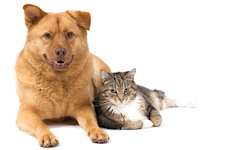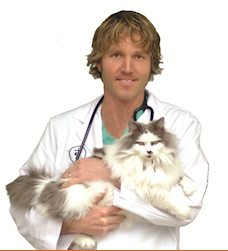 |
You are receiving this e-mail as a part of your subscription to Dr. Jones' newsletter, 'Veterinary Sec.rets'. See subscription information below. |
| |
|
 Hello Friend, Hello Friend,
A cheery Monday to you and ALL of your pets, and your entire family!
Last week my NEW video on Reiki was sent out to all of the new Inner Circle members- it has some surprisingly easy to learn techniques that you can apply to healing your own pets at home- especially for arthritis. I posted a NEW article on Friday, and you are going to LOVE next months video. Get the Reiki video here:
http://www.theonlinevet.com
A not uncommon sign of disease in your dog or cat is anorexia- or NOT eating.
You need to look for an underlying cause. This can be a decrease in appetite, or it can be that your dog or cat completely stops eating. If this has persisted, then your pet may be lethargic, weak – although you should not wait this long for clinical signs to appear.
The causes can include a sore tooth, to an abscess, to cancer. The important thing here is to get your dog or cat eating again before a 24 hour period of anorexia causes further illness. This is especially important for cats who can develop a condition called ‘Fatty Liver’ if they go for 48 hours or more without eating.
WHAT can you do?

OFFER SOMETHING TASTY. Canned food is more nutritionally dense, and often more appealing. Your dog or cat will often respond much more favorably to a higher protein, sweet smelling canned food – especially fish flavored.
WARM IT UP, AND ADD FLAVOR. Dogs and sick cats often have a poorer sense of smell. I have had good luck getting them to eat by warming up the canned food, then making it a little more tasty by adding garlic powder, or beef or chicken oxo cubes.
SEE YOUR VETERINARIAN. If your pet is very lethargic, not eating or drinking, and becoming dehydrated then see your veterinarian immediately. Ideally you are treating your dog or cat for anorexia before they completely stop eating or drinking. Your veterinarian will perform additional diagnostic tests, and this may lead to force feeding your pet, or even placing in some type of feeding tube.
OTC MEDICATION. Pepcid ( Famotidine) is a realtively safe OTC med that is becoming increasingly helpful in pets with anorexia. In practice I found it very helpful with cats not eating with chronic renal failure. The medication should never be administered without first consulting your veterinarian.
The typical dose administered is 0.25 to 0.5 mg per pound (0.5 to 1.0 mg/kg) every 12 to 24 hours.
//////////////////////////////////////////////
P.S. This weeks Inner Circle article update is a HUGE new Special Report on common dog and cat symptoms and there causes. IF you have a sign of disease in your pet that your wondering about, I advise checking the NEW report out. Here:
http://www.theonlinevet.com
Heal Your Pets At Home!
Best Wishes,
Dr Andrew Jones

DISCLAIMER: This information is for educational purposes only and is not intended to replace the advice of your own veterinarian. Dr Andrew Jones resigned from the College of Veterinarians of B.C. effective December 1 2010, meaning he cannot answer specific questions about your pet's medical issues or make specific medical recommendations for your pet.
PRIVACY POLICY: We will never rent, sell, loan, provide, barter, exchange or in any way make available your personal information to others. You can unsubscribe or change your email address at any time using the links at the bottom of this email.
Copyright 2010 Four Paws Online Ltd.
Tel: 1-800-396-1534
Fax: 1-888-398-1378
support@veterinarysecretsrevealed.com
|
|
|
|